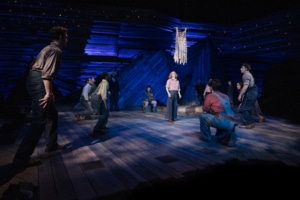DCPA NEWS CENTER
Enjoy the best stories and perspectives from the theatre world today.
Enjoy the best stories and perspectives from the theatre world today.
When the world premiere of Rattlesnake Kate debuted at the Wolf Theatre in 2022, it garnered a lot of positive attention. The play featured not only a spirited story about Kate Slaughterback, a Colorado woman who famously killed 140 rattlesnakes one day in 1925, but showcased how a play or musical might get commissioned by the Denver Center Theatre Company (DCTC).
“Neyla Pekarek [formerly of The Lumineers] had a concept album about Rattlesnake Kate and the DCTC heard about it and were like, ‘Wow, this is super great and we love the music,'” said Leean Torske, Director of Literary Programs and the main person who reviews submissions and commissions.

The cast of Rattlesnake Kate. Photo by andrewkellyphotography.com
The album, called Rattlesnake, was first heard in 2015 by Grady Soapes, Artistic Producer and Director of Casting with the Theatre Company. He felt the album would be a great foundation for telling the story of this brave woman, who, legend states, made and wore a dress make from the skins of the rattlesnakes she killed. Based on the lovely music by Pekarek, the locality of the story and the fun of the tale, the Theatre Company approached the singer to see if she was interested in doing a musical.
She was, and they paired her with book writer Karen Hartman to create the production. It took roughly six years and three workshops to perfect Rattlesnake Kate, but in the end the DCTC had a unique, successful show that debuted right in Denver.
This sort of serendipity doesn’t happen often, and, due in part to funding and staffing shortages, the way the DCTC handles script submissions and commissions has changed a lot since the pandemic. Torske oversees both, as well as the Colorado New Play Summit, which will take place this year on February 24 and 25.

Ben Huber and Jamie Ann Romero in the DCPA Theatre Company’s The Legend of Georgia McBride. Photo by Jennifer M Koskinen
“We receive hundreds of scripts every year, but generally only select four plays to have workshops and staged readings in the Colorado New Play Summit,” said Torske. “Our average season includes a variety of genres ranging from classics to musicals to critically acclaimed contemporary plays and world premieres, and we try to balance those genres in a seven- or eight-play season, which means we generally only produce two world premieres each year.”
Currently the DCTC isn’t accepting open submissions, but Torske said this policy is not forever; eventually the program will open up again. When it does, the DCTC will accept submissions from artists living within the region, literary agents and people they have previously worked with. When seeking out new and fresh plays, Torske said she looks for well-written, narrative-driven stories that appeal to Denver and surrounding regions, which includes not just Colorado, but Montana, Utah, Wyoming and other nearby states.
“We’ve had so many wonderful world premieres at the DCPA,” she added. “A few, and these really are just a few, of the highlights include Matthew Lopez’s The Legend of Georgia McBride, Lauren Gunderson’s The Book of Will, Moisés Kaufman and the Tectonic Theater Project’s The Laramie Project and Lauren Yee’s The Great Leap.”

The company of American Mariachi. Photo by AdamsVisCom
As for commissions, the process can take from a couple years to as many as 10, said Torske. There is no firm guideline on the project drafting process.
“You usually get a draft from the writer in about a year, and based on that, the theater gives them feedback,” she said. “Once it’s in a place to be workshopped, which is part of the commissioning process, that comes with actors and a director. It’s the first time the writer is hearing the play out loud and done by professional actors.”
Most of these new plays get workshopped at the New Play Summit. During this time hundreds of directors, actors, agents and publishing companies attend the festival, giving the best possible feedback the playwright, director and/or composer could want. Sometimes, added Torske, the new plays aren’t ready in time or it makes more sense to workshop them in New York City or Los Angeles, but that too is part of each particular work’s progress.
“There’s hope we will do the world premiere, but it’s not always the case,” said Torske. “The theater has the right of first refusal, but you might do a later production or not produce it at all.”
Geoffrey Kent and Dana Green, Rubicon staged reading. Photo by Michael Martin Photography
Plays that have gone through the commission process as success stories include, but are certainly not limited to, Samuel D. Hunter’s The Whale, José Cruz González’s American Mariachi, Tanya Saracho’s FADE, Theresa Rebeck’s The Nest, Marcus Gardley’s black odyssey, Karen Zacarías’ Just Like Us, Steven Dietz’s Shooting Star, and Molly Newman and Barbara Damashek’s Quilters.
Coming up at this year’s New Play Summit, the 17th since the program started, will be staged readings of Cowboys and East Indians by Nina McConigley and Matthew Spangler, Ghost Variations by Vauhini Vara, Godspeed by Terence Anthony and One-Shot by Andrew Rosendorf. There will also be world premieres of Cebollas by Leonard Madrid (running January 26 to March 10 at the Singleton Theatre) and Rubicon by Kirsten Potter (running February 9 to March 10 at the Kilstrom Theatre).
“We don’t see [these plays] as a risk; we see it as investing in an artist’s journey,” said Torske, adding that so far in the Denver Center Theatre Company’s history there have been 51 commissioned writers, over 100 new plays and more than 500 subsequent professional productions based on shows that DCPA originally produced. “It’s about being part of developing a work with them and gaining a deeper professional relationship.”
Of course, the end goal of accepting these submissions and giving out commissions is to tell a good story while entertaining the audience. Do that and you’ll have a new play that’s successful on all fronts.
